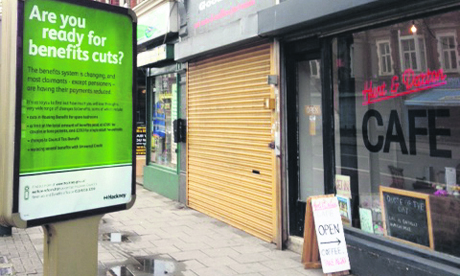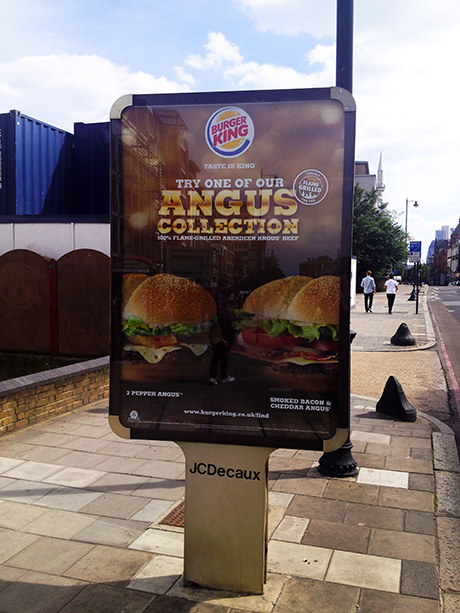Leader – Is clampdown on street clutter a tad confused?

Six-sheet board opposite a much smaller A-board. Photograph: Ella Jessel
Question: What is the most passé form of furniture?
Answer: Street furniture.
Hence moves to sweep railings, bollards and other junk that clutters up our pavements into the dustbin of history.
Such moves have proved a hit in other parts of London like Kensington’s Exhibition Road, which was de-cluttered as part of the trailblazing ‘shared space’ streetscape scheme, and Camden Town, where the stripping out of railings was so zealous it left cyclists flummoxed about where to lock their bikes.
Now the war on street furniture has a new enemy: the A-board.
Council’s D- for A-boards
A-boards are handy for small local businesses that hardly have the cash to advertise on billboards, but can they can prove tricky to negotiate for blind and partially sighted people.
Hackney Council has branded them an obstacle to pedestrians and has set about threatening shop and cafe owners with fines unless they clear them away (see Hackney Citizen Issue 44).
So, is the council also going around ripping out the so-called six sheet advertising boards that stand smack bang in the middle of many of our pavements and are far larger than A-boards? No. And in fact it is itself advertising on them.
Bind over contract
Hackney Council is currently tied into a 25-year contract with French advertising giant JCDecaux, which owns these concrete, illuminated obstructions.
JCDecaux apparently pays the Town Hall a fee and gives it a reduced rate for advertising.
But the details of the contract are unknown as, despite the Hackney Citizen asking the council for this information for several weeks, we have not been furnished with a copy.
The press office says the contract may be “commercially confidential”. It is also a mystery as to when the contract will be up for renewal.
The inconsistencies in the council’s approach to tackling street furniture went unmentioned at last month’s full council meeting, which heard a deputation from the organisation Foresight, which caters for the needs of blind and partially sighted Hackney residents and which had sent representatives to the Town Hall to humbly ask councillors to commit to permanently funding its activities.
Culture chief Councillor Jonathan McShane responded by pointing to the anti-A-board campaign as an example of how the council is helping blind people (the Royal National Institute of Blind People has called for an outright ban on A-boards).
Oh burger
Discussion of the six-sheet boards was nowhere to be seen, and the meeting later turned its attention to the subject of whether or not politicians should ban fast food outlets from opening up close to schools – somewhat ironic as the street-cluttering JCDecaux boards the council advertises on also carry adverts for… Burger King!

King in Kingsland: six-sheet boards rule whilst local businesses’ A-boards are banned. Photograph: Hackney Citizen

Further details required:
Is fine enforceable on a daily basis or does the fine allow the A-Board owner a period of fine-free display?
What are stats on Blind People/A-Board accident figures, Locally and Nationally?
How does A-Board removal impact on displayers trade?
Is lower turnover foreseen by traders as result of A-Board removal?
If trade falls as a result of A-Board removal, should not a reduction in Business Rates be factored in to the proposals?
Is A-Board fine designed to be a Business Rate increase under a stealthier and disparagingly alienating guise?
How much revenue does the Council anticipate raising from implementing fines?
How does the Council propose to redirect said raised funds towards realistically improving the pedestrian experience of the Blind?
In the light of the adverising content displayed by JCDecaux, how much revenue received from JCDecaux is redirected towards NHS Funds to offset increasing expenditure on child or indeed adult obesity and related illnesses?
Etc, etc……
At the recent full Council we heard from two visually impaired residents who told us there were 1000 blind and registered partially sighted residents. Additionally it is suggested there are the same number again that are not registered. There are many more that are mobility impaired residents some using various devices to help them get around our streets. Those that represent these residents tell us obstructions on the pavement reduce accessibility and their enjoyment of the public highway.
It’s not only disabled residents. Many of us, myself included, get fed up of cash machine, Western Union, Health lottery and other such boards all over the footways. We know more people will walk if the footways are clear. Most businesses don’t clutter the pavement with what are unlawful obstructions of the public highway and derive no benefit from these squalid A-boards.
Turning to the Decaux hoardings. These are the result of a poor decision made in 1995 to allow them on our paveents. The contract generates little money for the borough and supports two poor quality toilet cabinets at Dalston Junction and Kingsland Waste.
I think the contract is for 20 years, not 25. I tried to get rid of the boards several years ago, but wasn’t able to. They certainly need to go and I will be trying again as the contract comes to its end in 2015. Its good to know the Citizen is on board to help getting rid of these boards.
Regards
Cllr Vincent Stops
Cll stops,If this is about helping the visually impaired then what about cafes etc with tables and chairs on the pavement?Surely these present the same sort of obstacle that the a boards do.Then again the council are charging the cafes for this arrangement.
Dear Pat,
As I have said, it is in part about helping the visually impaired.
Chairs and tables are licensable and the space they use is managed by the council using a licensing system which defines the area they use. They are licensable because they are said to be of some ‘public’ benefit’.
Regards
Cllr Vincent Stops